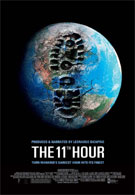You’ve seen The 11th Hour before, just in a different form. During those late nights either battling stress-induced insomnia or fighting sickness after one too many drinks, you’ve inevitably stumbled upon a Save the Children infomercial, in which the narrator strolls the desolate streets of some impoverished, third-world country with a malnourished, sickly child in tow. With horrific images and endless statistics, The 11th Hour is just as manipulative and guilt-inducing as any poor child in need of your help.
That’s not to say that The 11th Hour’s message isn’t important. The Leonardo DiCaprio produced and narrated (for no other reason than star power and recognition) film catalogues our destruction of the Earth – starting from when we began rapidly using resources during the industrial revolution to the current aftermath of burning fossil fuels, cutting down forests and polluting oceans, lakes, rivers and streams like there is no tomorrow. Through an endless stream of statistics and expert interviews with ecological big wigs, who love to point the finger, there is clearly a future of consequences that isn’t so bright.
Given the film’s 90 minute run time, 70 minutes is devoted to bashing the audience with devastating facts voiced over horrific images of natural disasters and man destroying his environment. Perhaps the film is best epitomized by the image of a man beating and killing a seal with a voice over condemning mankind. Of course, in a propaganda film that seeks to rally people to a cause, you have to scare the audience out of their complacency. Yet, from Al Gore’s smash-hit An Inconvenient Truth and all the political hubbub, most (sane) people know there’s a problem, and we need to hear less about the causes and more about the solutions.
By the time The 11th Hour gets around to the technological advances that could allow us to turn the environmental destruction around, we already feel defeated. It also doesn’t help that directors Nadia Conners and Leila Conners Peterson let their environmental experts slip into jargon-y, confusing dissertation about the healing properties of fungi and bacteria as a solution while visual explanations of cool, relatable technologies – like a dance club powered by human movement transferred through the floor or a house that is environmentally-designed to be more efficient through solar power – are cut through faster than the audience is able to process. Had Conners and Conners Peterson lingered on the environmentally-hip dance club technology as long as the man beating the seal, maybe we would have a bit more optimism instead of being beaten into submission.
Amidst the gloom and doom, like the Earth itself, several rays of cinematic hope shine through the film. The most profound being the interviews with Stephen Hawking. The disabled genius and author of “A Brief History of Time” communicates through an automated voice program; when he talks, his computerized voice seems to metaphorically fade into the voice of technology telling us about our impending doom. The unfeeling prophecy of destruction layered on top of the affecting music of Sigur Rós and Mogwai, spread over images of environmental destruction, creates the film’s most poignant and terrifying moments.
Ironically, the film mimics the Earth’s desolate fate. 20 minutes of hopeful solutions after 70 minutes of horrifying facts and revelations that almost seem to amount to no hope at all. Although the film’s presentation falters, its message is nonetheless important. However, The 11th Hour’s dismal tone and uninspired filmmaking will keep it from being seen by the masses that it’s targeting – something that's hopefully only detrimental for the film and not Earth.
Your Daily Blend of Entertainment News

